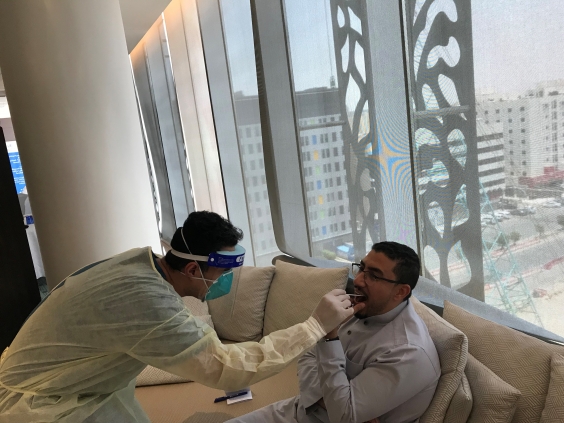 Participants role-played different scenarios to better prepare (Photo: Amgad Elkholy, WHO)
Participants role-played different scenarios to better prepare (Photo: Amgad Elkholy, WHO)12 July 2018 – During the first week of July, 24 public health experts gathered in Riyadh, Saudi Arabia, to receive training on how to respond to an outbreak of deadly Middle East respiratory syndrome (MERS) as part of a Rapid Response Team (RRT). Since late 2012, the MERS coronavirus (MERS-CoV) has infected 2229 people and claimed 791 lives (35.5%), with the majority of cases and deaths occurring in Saudi Arabia (1853 and 717, respectively).
Rapid Response Teams are technical, multi-disciplinary teams that are readily available for quick mobilization and deployment in case of emergencies. In the case of an outbreak of MERS-CoV, quick deployment of RRTs is key because of the virus’ highly infectious and deadly nature. In any outbreak, containment at source is critical to stop community-wide transmission. In addition, RRTs trained on MERS-CoV will be better prepared to respond to outbreaks of other emerging respiratory infection outbreaks, like SARS or pandemic influenza.
During the 5-day training, the RRT members, including epidemiologists, infection prevention and control specialists, nurses, laboratory experts and environmental health experts, learned the latest techniques regarding outbreak investigation and containment measures. Participants learned about the function, composition and operation process of an RRT; how to conduct a MERS field investigation; donning and doffing working with personal protective equipment; educating communities on health risks; and more.
The Infectious Hazard Management Programme of WHO's Regional Office developed the MERS RRT training package in English and Arabic, in collaboration with the Global Outbreak Alert and Response Network (GOARN) and the Centers for Disease Control and Prevention (CDC). After Saudi Arabia, the newly developed training package will also be rolled out to other countries in the region which are at high risk of MERS.




